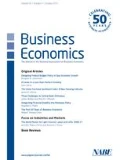Several pieces in this issue come from presentations given at NABE’s Economic Policy Conference in March. As has been the case in past years, we'd like to thank the Peterson G. Foundation for its grant to the NABE Foundation for the appearance of this material (and in advance for the additional conference material slotted for July).
In the first piece, Claudio Borio of the Bank for International Settlements discusses two possible explanations for the sluggishness of the world economy: secular stagnation (a fundamental slowdown of potential growth) and a lingering drag from the financial crisis. If one accepts the secular stagnation hypothesis, policymakers may decide to continue to sustain the low-interest rate environment, while, on the other hand, low interest rates would impede the correction from the financial crisis. Borio argues that the evidence for secular stagnation is overly reliant on the fine points of estimated econometric models, while history shows that the drag from financial crises can well linger. Thus, the prudent policy would be to assume that the financial drag hypothesis is correct, and not delay the removal of accommodative monetary policies.
The next two articles come from work presented at the 2016 NABE Annual Meeting. They both deal with the issue of low U.S. productivity growth; in particular, the arguments that some make that the reported numbers may well reflect particular problems tabulating the data. Both papers are dubious that reported low productivity is an illusion. Chad Syversson addresses the question of whether we are seriously underestimating productivity growth stemming from gains in high-tech services. He is dubious: basically, to accept some of the claims made about the contributions from this sector, one would have to imagine that aggregate GDP is truly around $3 trillion higher than BEA reports, which seems highly implausible. The paper by David Byrne, Steven Oliner, and Daniel Sichel addresses the issue through the lens of potential overstatements of high-tech price inflation. They acknowledge the possibility that the statistics might be overstating high-tech inflation, and thus understating the growth of the high-tech sector. However, higher figures for real high-tech growth would be largely offset by lower growth figures for industries using high-tech services, with relatively modest upgrades to the growth of aggregate output and productivity. They do note, however, that higher growth in the high-tech sector could be a positive sign for a future improvement in the aggregate growth rate.
The final two articles come from a panel at the Policy Conference dealing with monetary policy. The topic discussed is whether there needs to be legislation requiring the FOMC to announce and be held accountable for setting interest rates in line with a policy rule of the type John Taylor designed. The two authors have diametrically different views on the issue. Mickey Levy, a long-time member of the Shadow Open Market Committee, contends that FOMC policy is too often dominated by the dictates of econometric models and the latest ephemeral moves in the data, leaving markets puzzled as to the core drivers of policy. Commitment to a formal rule would provide clarification and should not inhibit the Fed’s ability to respond to financial crises. David Stockton, the former head of the Federal Reserve Board’s Division of Research and Statistics, disagrees. Stockton’s view is that all the factors that legitimately enter into the FOMC’s decisions cannot be summarized in a Taylor-type rule, and requiring the FOMC, through legislation, to use such a rule as the benchmark for policy would inhibit the Committee’s ability to respond rapidly to a crisis.
Apurv Jain reviews Weapons of Math Destruction: How Big Data Increases Inequality and Threatens Democracy. The book is a cautionary tale of how the rapid adoption of big data sets by business and governments may pose serious problems. The algorithms used in big data applications to classify people may be overly simplistic, putting the poor, in particular, at risk of being falsely categorized and losing opportunities.
ALLAN MELTZER
Recent months have seen the passing of some extraordinarily distinguished economists, including Kenneth Arrow and William Baumol. Among that group was Professor Allan Meltzer of Carnegie-Mellon University, who passed away on May 8. Meltzer was known for his work on monetary economics, both with Karl Brunner and independently, and was one of the originators of the Shadow Open Market Committee and the Carnegie-Rochester Conference on Economic Policy. He made a particular mark in recent years with his monumental multi-volume history of the Federal Reserve. In honor of his distinguished work, Meltzer received NABE’s 2003 Adam Smith award. Meltzer remained a spirited commentator on economic events, particularly monetary policy. His quip that “capitalism without failure is like religion without sin” will be long-remembered. While Meltzer’s views often provoked controversy, his voice will be missed.
Author information
Authors and Affiliations
Corresponding author
Rights and permissions
About this article
Cite this article
Steindel, C. From the editor. Bus Econ 52, 85–86 (2017). https://doi.org/10.1057/s11369-017-0039-z
Published:
Issue Date:
DOI: https://doi.org/10.1057/s11369-017-0039-z

